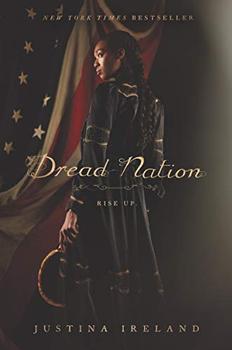Summary | Excerpt | Reviews | Beyond the Book | Readalikes | Genres & Themes | Author Bio

I know you probably worry about the number of undead out here in the East, but Baltimore County is the safest in all the country. They say so in the newspaper, and you know the paper would never lie.
Chapter 3
In Which I Relate My First Encounter with a Shambler
When I was little, back at Rose Hill, I used to sneak out of the kitchen, away from Auntie Aggie while she and the other aunties worked to feed all of the hungry mouths on the plantation. Once they were distracted I'd tiptoe out past the ovens and slip away to freedom in the fields.
Rose Hill mostly grew tobacco, which Momma and a couple of the bigger field hands would ride into town to trade for cloth and other essentials. Early on, back before I can remember, Momma had tried growing tomatoes and other vegetables; when it became obvious that her small bundle of tobacco was worth more than all the food combined, she switched. Momma is savvy like that. The dead may have risen and we might have been living in the end times of Revelation, but folks still wanted their tobacco.
The tobacco plants grew tall, and the leaves were broad and green. In the summer I could duck down and run through the rows undetected, which is what I did on this particular day. My goal was always the same: find the other kids, the ones that got to run the fields because their mommas weren't ladies who owned the plantation. The kids I liked best would be near the barrier fence at the far side of the tobacco fields, so I made a beeline for that patch of trouble.
A barrier fence is the line of security between shamblers and the rest of us, and Rose Hill had three such fences: whitepainted fence rails that had been our original property line and weren't more than pretty decoration, a dense forest of wooden poles with sharpened ends implanted in the ground at an angle that worked like stakes to impale any shambler enterprising enough to get to it, and, at the outer edge, a wall of five-strand bobbed wire that was our primary defense against the dead.
Once or twice a day the stronger men would go out to the bobbed wire and end any shamblers tangled up in it. Momma would have them bring the corpses in and burn them for the compost pile. If there were any valuables on the bodies, Momma and a couple of the men would sell them in town, bringing back something fine. One time there was a shambler that musta been a fine lady, since she was decked out in gold and jewels. Momma used the baubles to buy several hogs, and that was how Rose Hill came to have pork chops every Sunday after the Scripture was read.
But I didn't much care for that business. I was more interested in the children who hung out playing games in between the fences. I scrambled over the white split rail fence and carefully picked my way past the sharpened stakes of the interior fence. And there, between the safety of Rose Hill and the danger of the outside world, were the plantation kids.
Everyone on the plantation but Momma was a Negro, all excepting for Mr. Isaac. There had been other white men, once upon a time, but after the dead rose they'd either ran off or turned shambler. Mr. Isaac was different; he came to Rose Hill after the war. He lived on the plantation because he was married to Auntie Evelyn and relations between Negroes and whites were frowned upon. Momma didn't much care for, as she called it, "the spiteful leanings of biddies with too much time on their hands," and welcomed folks into the house staff as long as they didn't make too much trouble and were happy to work hard. So Mr. Isaac and Auntie Evelyn lived on Rose Hill with a passel of boys, the worst of which were the twins.
Auntie Aggie said twins were an ill omen, and anyone who knew the Isaac twins would agree. The boys were lightskinned, lighter than me, sandy-hued with unnervingly blue eyes. They always had a scam running, like the time they'd stolen a watermelon from the garden and climbed up a tree to share it, or the time they'd let loose all the dogs as a distraction so they could run off to fish in the creek on the north side of Rose Hill.
Excerpted from Dread Nation by Justina Ireland. Copyright © 2018 by Justina Ireland. Excerpted by permission of Balzer + Bray. All rights reserved. No part of this excerpt may be reproduced or reprinted without permission in writing from the publisher.
Harvard is the storehouse of knowledge because the freshmen bring so much in and the graduates take so little out.
Click Here to find out who said this, as well as discovering other famous literary quotes!
Your guide toexceptional books
BookBrowse seeks out and recommends the best in contemporary fiction and nonfiction—books that not only engage and entertain but also deepen our understanding of ourselves and the world around us.